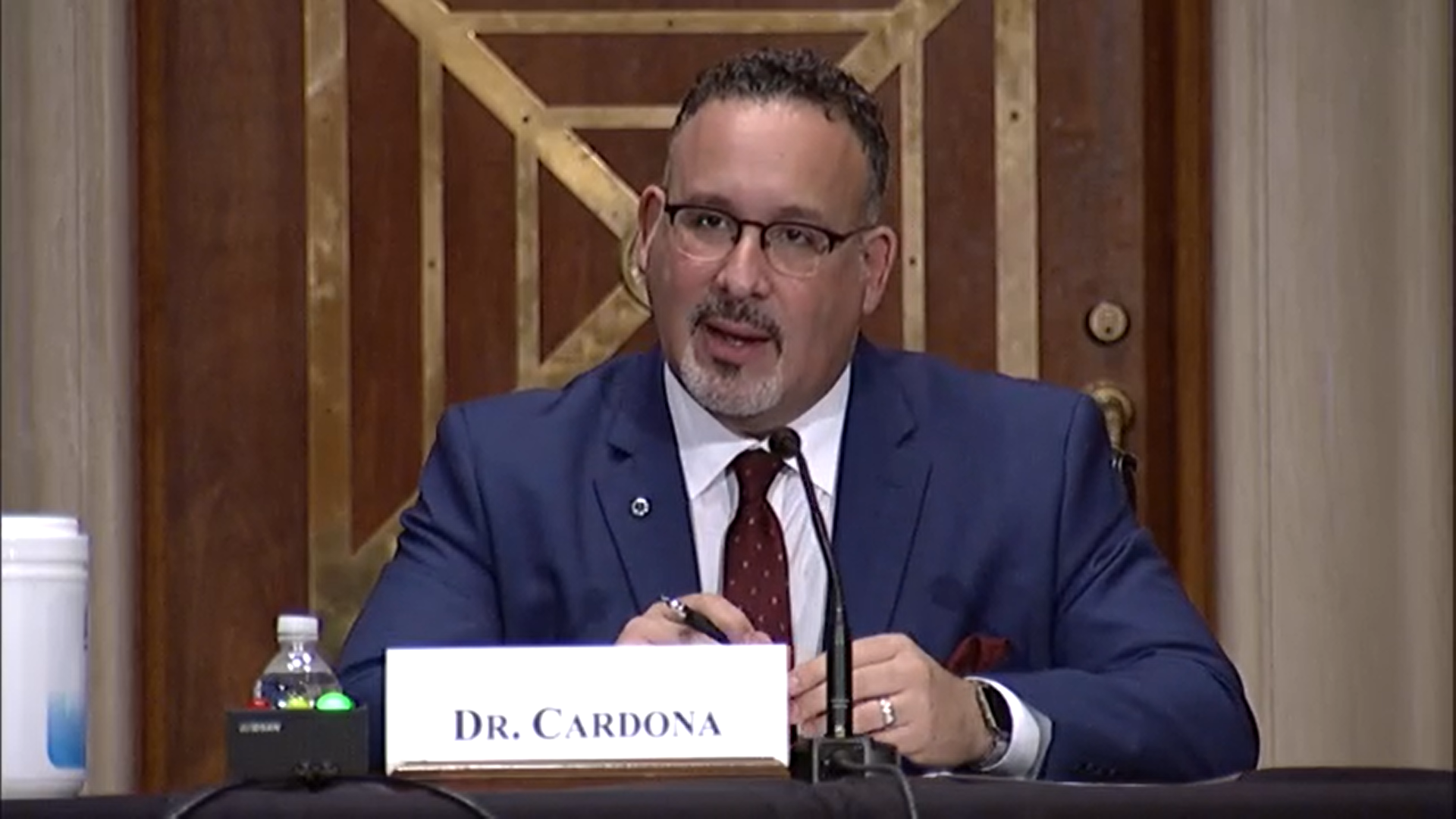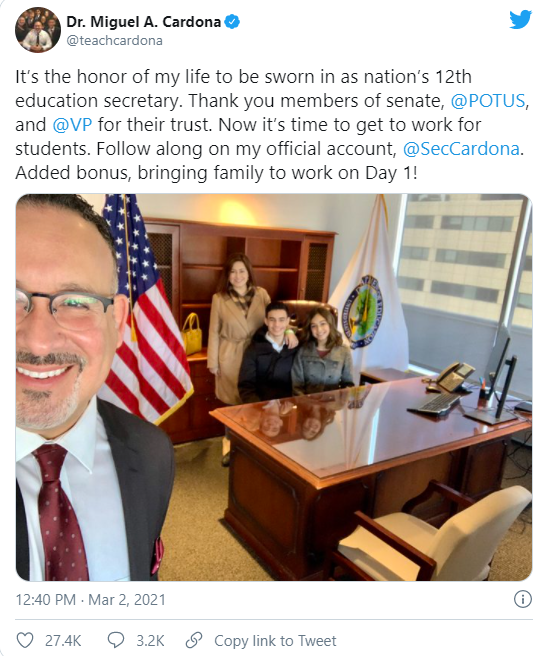Miguel Cardona Confirmed as Education Secretary
Senate votes 64-33 to confirm the longtime educator from Connecticut

Updated March 2, 2021
The Senate confirmed Dr. Miguel Cardona as the next U.S. Secretary of Education on March 1. The confirmation, which had been expected since Cardona's nomination, became official when the Senate voted 64-33 in his favor. In addition to Democrats, fourteen Republicans voted to confirm him.
Cardona, the commissioner of education in Connecticut, won by a larger margin than recent Education secretaries. Betsy DeVos' confirmation was famously contentious and she needed then Vice President Mike Pence to cast a tie-breaking vote, while John B. King Jr., the second Secretary of Education during the Obama administration, was confirmed by a 49-40 vote.
Cardona is the 12th person to be confirmed as Secretary of Education. He has made it clear that his priority will be to help schools across the country resume full-time in-person classes, and has outlined his five-point plan.
T&L recently reported on his confirmation hearing before the Senate education committee, which gives insight into how he plans to approach some of the major educational challenges of the moment.

Bipartisan Support
On Feb. 3, Cardona testified before the Senate education committee. As expected, the testimony and confirmation process was mostly non-contentious.
Sen. Richard Burr (R-N.C.), the ranking Republican member of the committee, set a cordial tone during opening remarks.
Tools and ideas to transform education. Sign up below.
“I expect by the end of this hearing, I'll be able to support your nomination,” Burr said. “And I will encourage all of my colleagues on my side to support you as well, and to move expeditiously to have you sworn in as the next Secretary of Education. I look forward to working with you.”
But the hearing was not without tense moments. During his testimony, Cardona gave additional evidence of what his priorities will be as secretary and answered sometimes pointed questions about specific policies he might pursue.
A Time of Crisis and Opportunity
In his opening remarks, Cardona talked about the dire situation the nation’s schools find themselves in because of Covid-19. “We're here today in the midst of one of the most challenging school years in American history,” he said. “For far too many of our students, this year has piled on crisis after crisis.”
But he did see glimmers of hope. “Our students have shown us a level of resilience that I don't think we've ever seen in history before,” he said. “Our students have really risen to the occasion and really adapted in ways that are inspiring to me as an educator and as a father.”
He also expressed the wish that the crisis could be used to forge a better education system in the future. “It would be my greatest privilege if confirmed to forge opportunity out of this crisis,” he said. “As Americans we've always risen to the challenge to solve problems and create a brighter future for our students.”
Cardona also referenced his Puerto Rican heritage. “There is a saying in Spanish: En la unión está la fuerza,” Cardona said. “In unity there is strength.”
Getting Students Back in School
As commissioner of education in Connecticut, Cardona pushed for kids to attend school in-person wherever possible. That will also be a priority he’ll pursue as U.S. Secretary of Education. He pointed to learning loss and how education disparities are being exasperated with digital learning. “There is no substitute for a classroom experience for our students,” he said. “We have to do everything we can to safely reopen schools.”
He added, “I think that needs to include increased surveillance testing for our educators and prioritization of our educators for vaccination.”
Reducing Student Debt
Sen. Elizabeth Warren (D-MA) asked Cardona if he would commit to using the power Congress granted the Department of Education to help borrowers with student loan debt, which includes overseeing the office of Federal Student Aid. Cardona responded that he would and noted how high student debt is and how it is exasperating differences between the “haves and have nots.”
Cardona did not offer specifics, and in the past has said that although student debt forgiveness would be a priority of his, he would work with Congress to accomplish that goal.
Community College and Technical Training
At several points during the hearing, Cardona praised community colleges, hailing them as “institutions that have long served as entry points to higher education and economic mobility for so many.”
He also talked about his own experience attending a technical high school in Connecticut before pursuing a career in education, and about how multiple educational pathways should be highlighted to students at a younger age. “We can really start thinking about how we're providing opportunities for our middle and high school students to be exposed to the jobs of today and pathways that include community college or career technical education, or advanced manufacturing science training,” he said.
Points of Disagreement
Sen. Rand Paul (R-KY) repeatedly questioned Cardona about whether he agrees with a decision by the Connecticut Interscholastic Athletic Conference to allow transgender students to participate in sports based on gender identity.
“You're OK, then, with boys competing with girls?” Paul said, unhappy with Cardona’s initial response.
Cardona responded, “Respectfully, Senator, I think I answered the question. I believe schools should offer the opportunity for students to engage in extracurricular activities, even if they're transgender.”
Other Republicans on the committee, including Mitt Romney from Utah, pressed Cardona on this issue.
There were also questions about whether year-end standardized tests should be resumed this spring, as assessments such as these were previously paused because of the pandemic. Cardona said bringing students into schools just for testing was pointless but that it provided a valuable assessment tool.
Asked about school choice by Sen. Tim Scott, (R-S.C.), Cardona said, “I recognize that there are excellent examples of charter schools. I've seen many in Connecticut.” But he said most parents want to send their kids to their neighborhood school, so it's really important to support all schools. He added, “My passion really is to ensure quality schools, period.”
Further Reading
Erik Ofgang is a Tech & Learning contributor. A journalist, author and educator, his work has appeared in The New York Times, the Washington Post, the Smithsonian, The Atlantic, and Associated Press. He currently teaches at Western Connecticut State University’s MFA program. While a staff writer at Connecticut Magazine he won a Society of Professional Journalism Award for his education reporting. He is interested in how humans learn and how technology can make that more effective.

